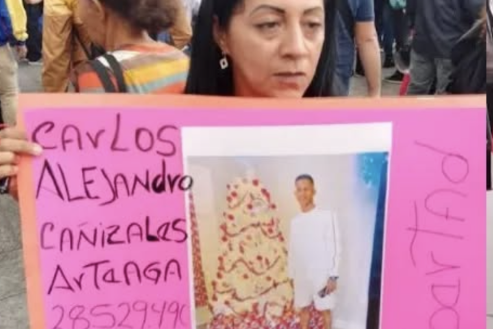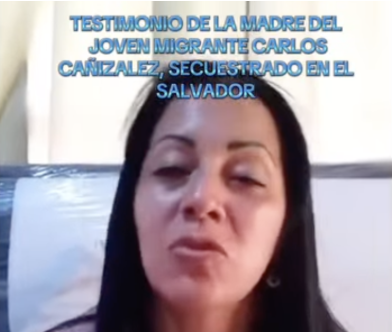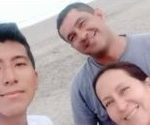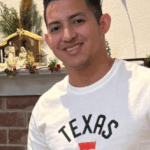Carlos stayed in contact with his family initially. He told his mother, Jetzy Arteaga, that he preferred being free in Venezuela over being imprisoned in the U.S. and had signed deportation papers.
On March 15, 2025, Carlos called from detention in Texas, saying he was being deported to Venezuela. His family prepared to receive him, but the next day, they learned the flight was diverted to El Salvador. Videos surfaced showing detainees, including Carlos, chained and having their heads shaved, resembling scenes from a horror movie. His family identified him in the footage.
Later, Carlos’s name appeared on a leaked list of men transferred by the U.S. to CECOT prison in El Salvador — without trial or evidence of gang affiliation.
Jetzy pleads: “Investigate. If someone has a criminal record, let them face justice. But the innocent must be freed. We mothers won’t stop fighting. I will go to El Salvador and chain myself to that prison if I must to get my son back.”
Carlos Alejandro Cañizales Arteaga (25) is originally from Valencia, Carabobo State. In Venezuela, he worked as a mechanic alongside his father. Carlos is not a criminal; he has never belonged to any criminal organization according to his mother, Jetzy Arteaga.
Carlos emigrated to the United States in the summer of 2024. But in February of 2025, he was arrested in a raid in North Carolina with seven other young Venezuelan men.
One of the other men arrested in the same raid, Ysqueibel Penaloza’ mother recounted what her son told her about the raid: “It was traumatic – he told me they arrived by helicopter and by land, dressed and covered up like riot police, as if they were going to arrest someone very dangerous. My son was told nothing about why they were arrested, nor was he shown a warrant.”
The first few days after Carlos and the seven other Venezuelans were arrested, Carlos was in communication with his wife and with mother. “I would rather be in Venezuela free than in the United States in prison. I am going to sign my deportation papers,” Jepzy remembers Carlos telling her at that time.
On Friday March 15, 2025, Jetzy said Carlos called from detention in Texas. “He told me, ‘Mom, it’s ready, they’re going to deport us, I signed my deportation papers, they’re taking us to Venezuela.’ I told him, ‘Be happy, son, it’s okay.’” But in the evening, she received another call from Carlos saying there had been a delay due to weather and Carlos would be coming to Venezuela a day later.
On Saturday, Jetzy sent her niece to buy some balloons to welcome Carlos. “Until 12 noon, everything was going well. My daughter called me at 3 p.m. to say that he hasn’t arrived,” Jetzy said, but she didn’t start to really worry until the evening. “We were glued to the television at 9, 10 o’clock at night, and nothing.”
Jepzy received the bad news from her other daughter, who is still in the United States, that the plane that left the Texas immigrant prison, where Carlos Alejandro was, had been sent to El Salvador. “Shortly after, images began circulating on social media that looked like a trailer for a horror movie, with human beings chained together as if they were ferocious beasts,” Jetzy said.“When I saw the video of my son, when they were removing his hair with the machine, he was a little unrecognizable; but we managed to identify him. My daughter told me, ‘That’s Carlos Alejandro,’” Jepzy remembers.
A few days later, Carlos’ family’s worries were confirmed when they saw his name on the leaked list of men sent by the US to CECOT prison in El Salvador without a trial or evidence that he is a gang member.
“What worries me most is the life they’re living, the moment they’re experiencing there in El Salvador. Everyone has seen that prison, how dangerous it is. They’re not used to living like that, because they’re not criminals.”
“Please investigate,” Jetzy demands of the Salvadoran authorities. “Anyone with a criminal record should pay what they owe; but those who are innocent, please bring them here. All of us desperate mothers are here, and we will continue fighting. “”If I have to go to El Salvador to look for my son, I’ll look for him. If I have to go and chain myself up in that penitentiary, I’ll do it, because for a child, you do anything. I never imagined I’d be where I am right now,” she added.
Carlos se mantuvo en contacto con su familia al principio. Le dijo a su madre, Jetzy Arteaga, que prefería estar libre en Venezuela que preso en Estados Unidos, y que había firmado los papeles de deportación.
El 15 de marzo de 2025, Carlos llamó desde un centro de detención en Texas, diciendo que iba a ser deportado a Venezuela. Su familia se preparó para recibirlo, pero al día siguiente se enteraron de que el vuelo había sido desviado a El Salvador. Comenzaron a circular videos que mostraban a los detenidos, incluyendo a Carlos, encadenados y con la cabeza rapada, en escenas que parecían de una película de terror. Su familia lo identificó en las imágenes.
Más tarde, el nombre de Carlos apareció en una lista filtrada de hombres transferidos por EE.UU. a la prisión CECOT en El Salvador, sin juicio ni pruebas de afiliación a pandillas.
Jetzy suplica: “Investiguen. Si alguien tiene antecedentes, que responda ante la justicia. Pero que liberen a los inocentes. Las madres no dejaremos de luchar. Iré a El Salvador y me encadenaré a esa prisión si es necesario para recuperar a mi hijo.”
Carlos Alejandro Cañizales Arteaga (25) es originario de Valencia, estado Carabobo. En Venezuela, trabajaba como mecánico junto a su padre. Carlos no es un criminal; nunca ha pertenecido a ninguna organización delictiva, según su madre, Jetzy Arteaga.
Carlos emigró a los Estados Unidos en el verano de 2024. Pero en febrero de 2025, fue arrestado durante una redada en Carolina del Norte junto a otros siete jóvenes venezolanos.
La madre de Ysqueibel Peñaloza, otro de los jóvenes arrestados en la misma redada, relató lo que su hijo le contó sobre lo ocurrido: “Fue traumático – me dijo que llegaron por helicóptero y por tierra, vestidos y cubiertos como policías antidisturbios, como si fueran a arrestar a alguien muy peligroso. A mi hijo no le dijeron por qué lo arrestaban ni le mostraron una orden judicial.”
Los primeros días después de la detención, Carlos se mantuvo en comunicación con su esposa y con su madre. “Prefiero estar en Venezuela libre que en Estados Unidos preso. Voy a firmar los papeles de deportación,” recuerda Jetzy que le dijo Carlos en ese momento.
El viernes 15 de marzo de 2025, Jetzy dijo que Carlos llamó desde un centro de detención en Texas. “Me dijo: ‘Mamá, ya está listo, nos van a deportar, firmé los papeles de deportación, nos llevan a Venezuela.’ Yo le dije: ‘Alégrate, hijo, está bien.’” Pero en la noche recibió otra llamada de Carlos diciendo que había un retraso por el clima y que saldría hacia Venezuela un día después.
El sábado, Jetzy envió a su sobrina a comprar globos para recibir a Carlos. “Hasta las 12 del mediodía todo iba bien. Mi hija me llamó a las 3 p.m. para decirme que no había llegado,” contó Jetzy, aunque no comenzó a preocuparse seriamente hasta la noche. “Estábamos pegados al televisor a las 9, 10 de la noche, y nada.”
Jetzy recibió la mala noticia de su otra hija, que aún está en Estados Unidos: el avión que salió de la prisión de inmigración en Texas, donde estaba Carlos Alejandro, había sido enviado a El Salvador. “Poco después comenzaron a circular en redes sociales unas imágenes que parecían un tráiler de película de terror, con seres humanos encadenados como si fueran bestias feroces,” dijo Jetzy. “Cuando vi el video de mi hijo, cuando le estaban rapando con la máquina, estaba un poco irreconocible; pero logramos identificarlo. Mi hija me dijo: ‘Ese es Carlos Alejandro,’” recuerda Jetzy.
Días después, los temores de la familia de Carlos se confirmaron al ver su nombre en la lista filtrada de hombres enviados por EE.UU. a la prisión CECOT en El Salvador sin juicio ni pruebas de que pertenezca a una pandilla.
“Lo que más me preocupa es la vida que están viviendo, el momento que están atravesando allá en El Salvador. Todos han visto esa prisión, lo peligrosa que es. Ellos no están acostumbrados a vivir así, porque no son criminales.”
“Por favor, investiguen,” exige Jetzy a las autoridades salvadoreñas. “El que tenga antecedentes debe pagar lo que debe; pero los que son inocentes, por favor, tráiganlos. Todas nosotras, las madres desesperadas, estamos aquí y seguiremos luchando.”
“Si tengo que ir a El Salvador a buscar a mi hijo, lo buscaré. Si tengo que ir y encadenarme a esa penitenciaría, lo haré, porque por un hijo uno hace cualquier cosa. Jamás imaginé estar en la situación en la que estoy ahora,” añadió.







Leave a Reply